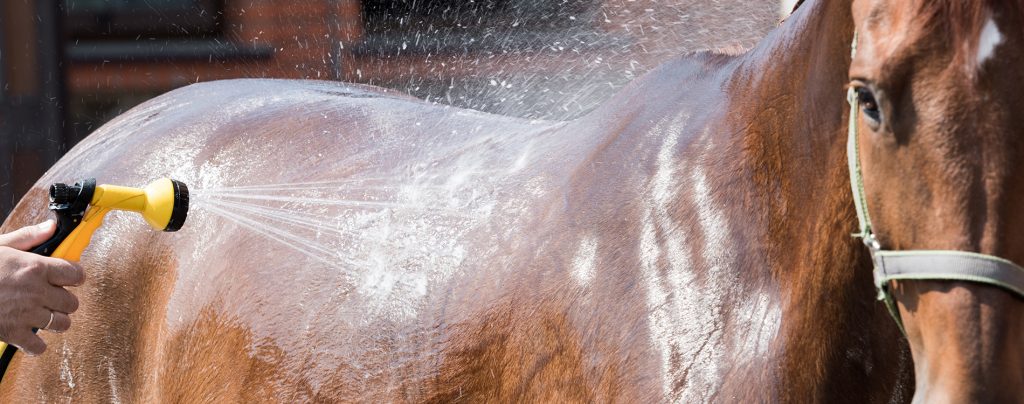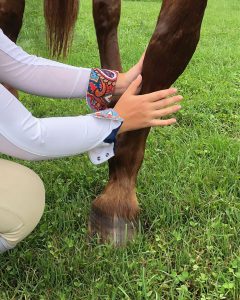
It’s August, the dog days of summer are here, and temperatures are high everywhere. You and your horse just finished a great ride—and now both of you are hot, sweaty and a bit tired.
As you head for the wash rack to rinse your horse with cool water (perhaps looking forward to a bit of the overspray yourself) consider using a brace to refresh, revive and relax your horse. Concerned about minor swelling or soreness in your horse post-workout? A liniment might be just the preventative measure to take.
At Dover, we’ve noticed many of our more senior staff members grew up using horse liniments and braces regularly, while the younger generation of staff members isn’t always as familiar with this great grooming aid.
For years, horse owners and trainers have used horse liniments to temporarily soothe tired, sore or stiff muscles, ease minor aches, pains and swelling, help lessen arthritic pain, and even to act as a topical antiseptic. Applied to legs or other specific areas after a workout, a liniment can help support tissue recovery, relieve post-exertion fatigue or help prevent stocking up (edema) in the legs, especially when topped with standing wraps.
Added to a bucket of water, a liniment becomes a brace that can be sponged onto a wet horse. It is left without rinsing to provide a cooling sensation and to relieve minor muscle soreness as the horse relaxes after a workout. Use of a liniment or brace in helping a horse recover from exercise can in turn help keep the horse comfortable and better prepared to perform the next day.
Liniments are available in liquid and gel forms, and they come in a range of formulas and scents ranging from brisk or medicinal, to lighter or natural. Most contain alcohol, which evaporates quickly. As a main ingredient in a liniment, alcohol’s rapid evaporation can help cool a horse quickly. Essential oils, herbs or medicines added to the liniment lend their supportive, beneficial or aromatic properties.
Read Liniment Labels
With all this said, liniments (and braces) are not all the same. Take these tips into consideration as you choose a new liniment for your horse, and always read manufacturer’s labels carefully.
- Some liniments contain substances on the USEF banned substance list and should not be used if you plan to compete in recognized shows.
- Some liniments are mild enough to be used under bandages or coverings or on broken skin, but some can cause blistering or tissue damage if covered.
- Not all liniments can be diluted in water to make a brace.
Test a small spot on your horse prior to full application to look for signs of an allergic or adverse reaction.
As a final note: While we love our liniments, they are not the remedy for a major soreness or lameness. Always contact your veterinarian with questions and concerns about your horse’s comfort, soundness, and managing exercise in high heat.
Browse our entire selection of horse liniments here.
Does your horse enjoy a liniment bath? Share your photos with us on Instagram and Facebook by tagging @doversaddlery!




